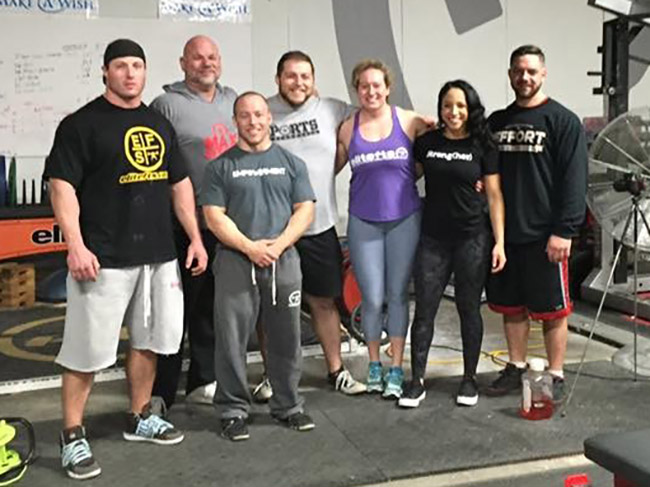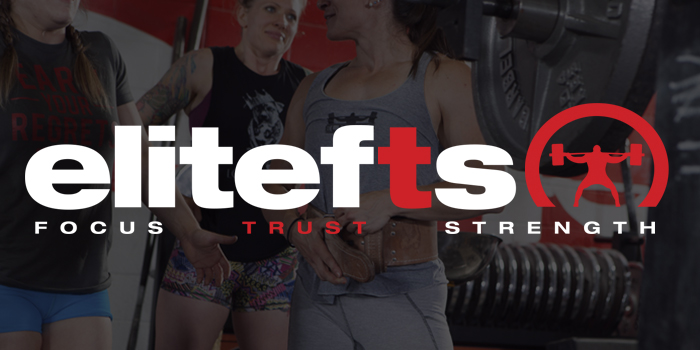
Originally published in July 2016
Before getting into this article I want to note that not every powerlifter needs to train in a group structure. There are many that have trained by themselves and have done extremely well, broken world records, and gone to become legends in the sport. Sometimes, you don't have any other choice. In most cases, you do have a choice. If you want to get better, want to advance in the sport and become stronger, the number one way to become stronger above anything else is to align yourself and to start training with other people.
This is something that I have seen over the past five to six years that is starting to become lost. Because of that, I think a lot of lifter's technique and form have fallen by the wayside. At the same time, a lot of lifters are leaving a lot on their total that they could make up if they were training within a group structure.
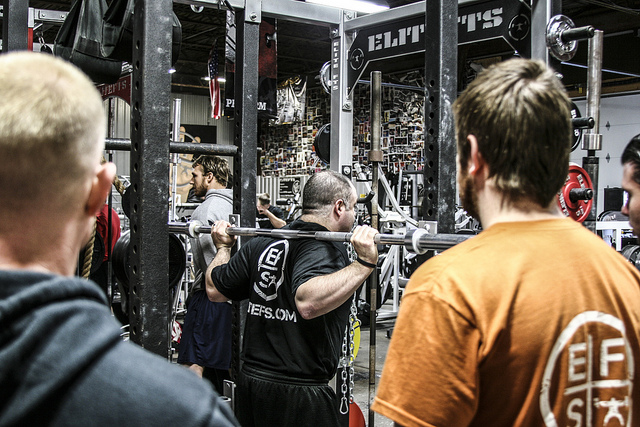
Synergy
I have done this with many small clinics that I have put on with lifters. After teaching them basic technique, time permitting, I will have them train all on the same rack with five to six lifters, training back-to-back, then setting it up in such a way there is no bullshit. There is no chit-chat. There is only verbal cuing based on what the lifter needs. These needs are determined during the technical part of the seminar.
I have found that, in all cases that I have done this, the intensity and effort goes up tremendously. The technique of the lifters improves significantly because they have four people cuing them. Over a period of time the cues go from being audible (from one person to the lifter), to internal (the lifters cuing themselves in their heads) to being automatic (no cue needed). This is part of a learning process.
RECENT: Verbal Cues Every Set — A Reminder of Your Duty as a Training Partner
When you train alone, you skip the first part of this process. You don't have someone verbally cuing you. When you skip this first part of the process you are going to have to try to do everything yourself, in your head, and as soon as you strain you are not going to do it. You are going to forget. You are going to resort to old habits. If the weight is heavy and you are doing a triple, after the first rep is rough, you will forget to cue yourself. When you have other people there, they will cue you, creating that synergy. synergy.
Look back on any group sport setting that you have ever been in before. Even if you go to a rock concert or any type of public outing where people are cheering, if you were the only person there and there was a group on stage, would you cheer? Would you be singing along with the song? No. But if everybody else is, you are.
Why is that? There is a synergy when it comes to group dynamics. When you apply that synergy into your training, it can propel you to a whole other level.
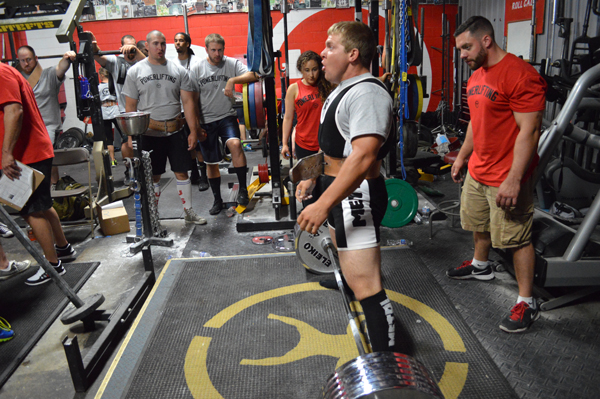
Education
Everybody wants to learn more about training, but there are some things that you can only learn in the gym. There are some things that you are only going to learn by yourself. Some things you have to learn the hard way. If you're around other people, you might not have to learn things the hard way, because they have already made that mistake for you. These are the people you want to train with.
If you have a question and are with a group of five other people who are also training and learning, you will be able to toss those ideas around. If someone runs into a sticking point, it is not just you yourself trying to figure out how to overcome that sticking point. If you ask someone online how to overcome that sticking point, when they have never seen you train or know the kind of effort you put into it, they aren't going to be able to fix it. They don't know if you are timid. They don't know if you push. They don't know if your technique is fucked up. They don't know how you come in the gym, if you look like shit. They don't know if you are getting enough sleep. They don't know how you eat.
There are so many factors that they don't know, that when you ask someone online, "Hey, how do I overcome the sticking point on my dead lifts? It stops just right after my knees," they just look at the video then kind of go off of their gut and guess.
We can try to do our best, but there is only so much data we have to work with. If you were training in a group with three to four other people like the ones I've been in, we would know the answer before you even got the question out of your mouth.
MORE: Top Four: What Are Your Priorities?
More than likely, we have been telling you what the fuck to do for the past six weeks but you haven't been doing it. That is part of the educational aspect that gets lost when you don't have that personal development or that personal team training environment. They are watching what you look like when you come into the gym, what your mood is, and they know more about you than what anybody could ever know online just by the nonverbal. All of that stuff adds up when it comes to education and learning about lifting.
At a certain point, if you want to became great, you are going to have to learn how to figure this shit out yourself and you are going to have to rely on those people you are training with to help you do that. If you don't have people that you are training with to help you do that, it is going to take so much longer and more than likely you will be out of the sport before you ever get to see what your true potential actually is.
It does take time. How many times have we read that this is a marathon, not a sprint? That statement is true. It takes a lot of time. When you have training partners that are educating themselves and they are learning with you, or they already know more than what you know, that time is reduced dramatically. They have already seen it and they can help you figure out what those small little issues are that nobody else is going to be able to see unless they are training with you.
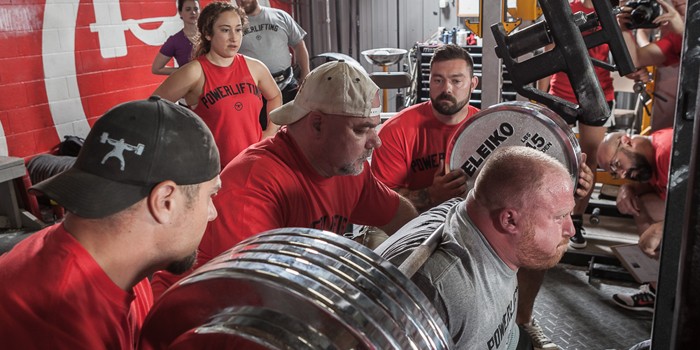
Technique
I already covered technique and verbal cues but I want to get on this one more time because it is so important. For you to learn a skill, that skill has to be taught to you. You either have to see it, hear it or feel it. Everybody's sensory needs are a little bit different for how they learn, but someone has to be able to show you that and then reinforce it.
This is just basic coaching that we are talking about here. If you played any sport, you've had coaches that taught you, talked you through, and cued you. They cue you over and over so you can begin to start cuing yourself. At that point, the cues will still be there from the people you are training with and the coaches, but they are going to be less frequent and they are going to happen when they are needed, not all the time.
This whole mental process, the whole mental game, has to be developed so you can make these decisions and make these adjustments while you are straining under heavy load. It is easy to make the adjustments when the weight is light and when somebody is showing you how to do something in a seminar or a clinic. It is very easy. As soon as the weight starts to be a little bit heavier, you are going to have to rely on the cuing.
A lot of times when you get a meet, that cuing is not going to be there. Either the coaches are not allowed on the platform, they are too far away, or your mental state is going to tune them out. By the time you get to the platform, it has to be automatic. It is an integral part of why you should have to have other people to train with and those people that you train with should be proficient on being able to help you with your form, style, and technique.
Accountability
When you are training with other people, it is simple: you have to be more accountable. You are not going to blow off training because other people are waiting for you to be there. Your accountability is also going to increase the effort that you will put in. You are going to work harder. Your training partners will know when to push you and went to pull you back, and you'll do the same for them. That is all part of being accountable to yourself and being accountable to the other people you are training with. As soon as that accountability comes into play, how you approach your training and how you approach moving forward in the space becomes more serious.
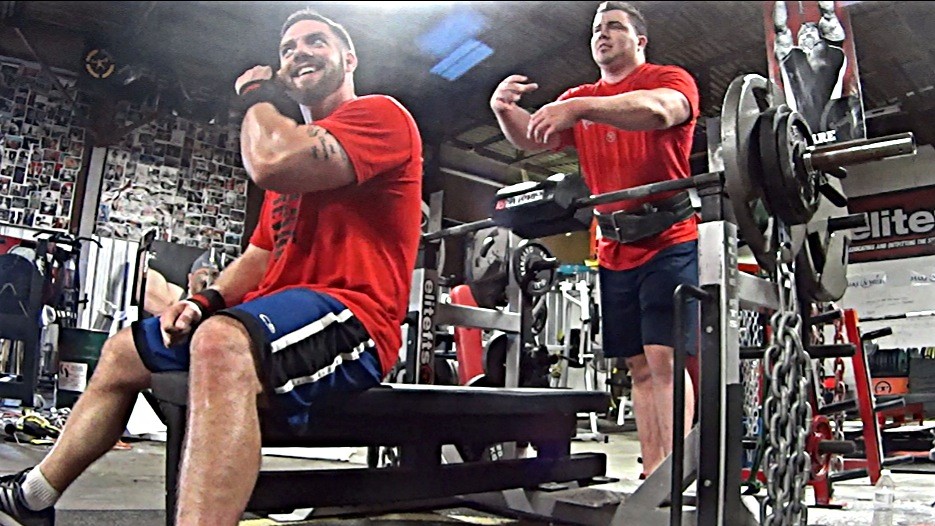
This isn't to say that you can't hold yourself accountable. I noted in the very beginning of this, many people do that and they do it every effectively. The majority of people don't.
Responsibility
When you train with other people, you are also responsible for those other people. You're responsible for their progress. You're responsible for helping your other training partners get better.
You're only as strong as your weakest training partner. If you keep that in mind and you are working on trying to strengthen the weakest link—the weakest training partner in the club—the more that you work with them, the more it reinforces your ability to coach. The more it reinforces your own learning process. The more you coach, the more you learn. The more you learn, the better you get. By helping other people, you will become better as a lifter.
Spotters and Loaders
This is a simple one. When you are training with other people, you have people to help spot and load. You don't have to rely on safety pins or straps to keep you safe. It creates a safer environment for you to lift in. The safer environment is going to create a more confident environment. If you are worried that you don't have spotters or you worry that you have to grab some slap-dick from the other side of the gym that can't pick up a 20-pound dumbbell to spot you, how confident are you going to be for the lift?
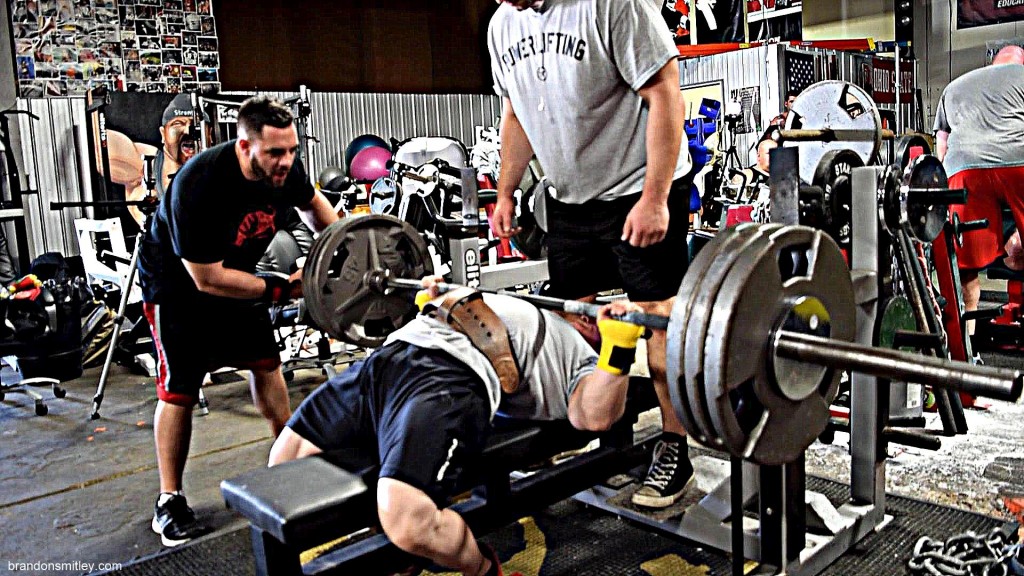
Even if this element of danger is something that motivates you, you have to keep in mind, what if something does happen? Then you really are taking your face off. It is a good motivating thing until you actually think about the fact that you can take your face off with the bench press or blow your knees out in a squat. You have to have people to spot that know what the fuck they are doing.
When you have training partners, you have inherent spotters and loaders. There is nothing worse than when training alone and you're pulling or dead lifting and you have to load your own weight before your own attempt. It is one thing to load and change the weights of somebody else's attempt when you still have a couple of other people in front of you. It is another thing when you have to load the weight, rest, and do it yourself. It sucks. Knowing that the weight is ready and you have spotters ready helps tremendously from a confidence standpoint. It helps from a safety standpoint and it actually helps to kind of simulate a "meet" setting in a way.
The Melting Pot
Training partners are like a melting pot. The cool thing about the sport of powerlifting is there are so many different backgrounds and so many different people that all love to train. They all love training heavy. They all love powerlifting. You can be training with people that you would never associate with outside of the gym. That exposes you to different mind sets, different thought processes, and different ways of thinking outside of your own. That is a good thing. It makes you more in touch with what is really going on in your town. I don't want to say in the world, but it makes you more in touch with what is going on within your community.
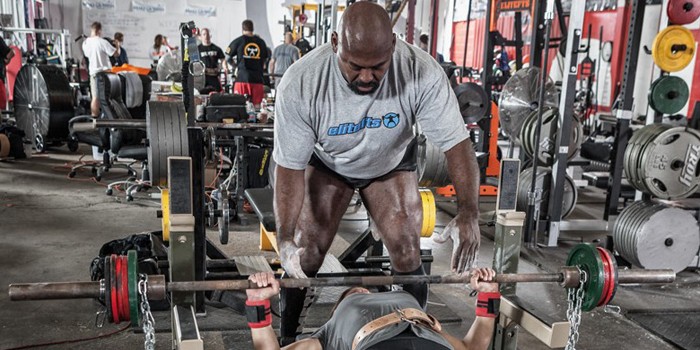 I've had training sessions and I've had groups with training partners where one is a cop, one is a drug dealer, one is a pimp, one is a surgeon, and one is an executive. They are all training together. They all know what each other does, but in the gym everybody is the same. If there is any judgment, the judgment is based upon how much weight you can lift. That would be the pecking order.
I've had training sessions and I've had groups with training partners where one is a cop, one is a drug dealer, one is a pimp, one is a surgeon, and one is an executive. They are all training together. They all know what each other does, but in the gym everybody is the same. If there is any judgment, the judgment is based upon how much weight you can lift. That would be the pecking order.
Outside of that, all is the same. Being able to be in that kind of a diverse setting with people who have such different backgrounds is not just important for your own training but it is important for your life skills and your own social skills as well.
When training with other people, especially if those people are stronger than you—and I highly suggest you always try to seek out people who are stronger than you—your perception of what is strong will change. If you're the strongest person in your club now, then you start training with people who all total 300 or 400 pounds more than you, you go from being the strongest person in your club to being the weakest person in your club. It won't take long for you to start making progress again. Your perception on what strong is will have changed because you're seeing people doing reps with what your max is. All of the sudden, your max doesn't seem so heavy to you.
To go along with this same theme, it's way easier to chase than it is to lead. If you're the strongest person in your gym right now, then you are the head guy. It is your responsibility to make sure everybody else in the gym is stronger, but more than likely you're probably not. You are off training by yourself, squatting your own rack, benching and asking people for spots if needed. When you get into an environment where you have to chase who is top person is, it is easier to do than when you actually become the top person. When you become the top person, you can become very complacent, especially if there is nobody biting at your heels to try to make you better or try to surpass what you have done.
This is another reason you want to get around people that are stronger than you. If you are stronger, that is why you want to have people who are going to try to be stronger than you, because it is going to help propel you and help push you knowing that there is someone on your heels.
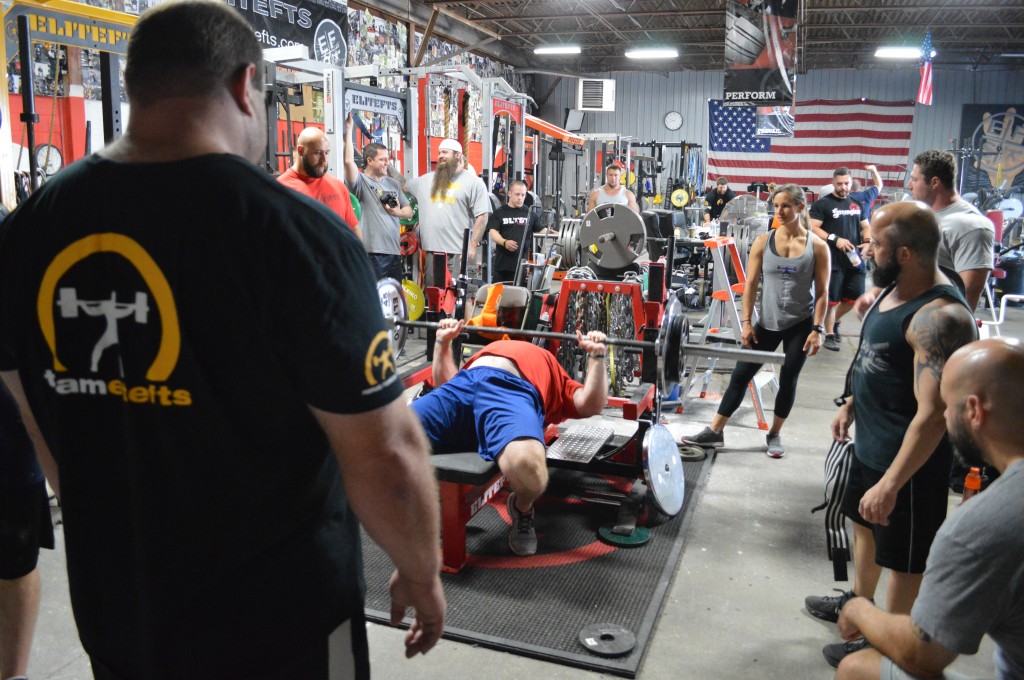
Social Interaction
To me, any live social interaction is good social interaction. From that perspective, just being around other people is a good thing. People are not around other people as much as what they used to be. The social interaction just from a social dynamic standpoint is a huge thing. I think it is a healthy thing. It is something that has been lost that needs to be weaved back into society. I will leave it at that. I don't want to go into some big rant about the lack of socializing.
The bottom line takeaway here is a sub-par program with really good training partners and a good group of lifters that you are training with will always trump the best training program in the world done alone. There is no doubt about it.
Additional Factors
There are intensity factors, hard work, work ethic, accountability, responsibility and all of the things I've discussed and listed throughout this post that all play into becoming a better lifter. This leaves only one question: how to do you find a group? It really shouldn't be that big of a problem.
Years ago I could see where that was a problem because we didn't have all of the social networks that we have now. The social networks we have now should make it really easy to figure out where the fuck people train. Once you find out where they train, you just ask. It's not that big of a deal.
The worste thing that could happen is that somebody is going to say no. If they say no, don't take it personal. There are a lot of people who do prefer to train alone. There are a lot of people who have been in this sport for a very long time and have very busy schedules. They don't want a training group. They really don't care. You probably don't want to train with them because they don't care about becoming stronger anyhow. They just want to get in the gym, train, and leave. They would be good to ask questions to, be advisors, but they probably would not be the best training partners because they don't have the time or the desire to want to be in there, work that hard, or be in the gym that long.
If you're asking those people and they say no, it's not an insult in any way. It is not part of their life. It's not something that they want to bring into their life because of time constraints or any other reasons. More than likely the biggest thing in play is that it is not their number one priority. That's fine.
Most of the guys that I know that train in groups don't train together every single training session. That's fine. Find out how your schedules can work together and do those sessions together. The guys I'm thinking of might get together for a squat-pull training session once a week and they might get together for a heavy bench once a week. The other training sessions they do per week are on their own.
When it comes to the big days—the squat days, the bench days and the pull days—they are getting together with other people to help drive those lifts and to make them better. It is not like you have to turn your life completely upside down to find good training partners. We are talking just a couple of days per week. That is well worth traveling 30 or 40 minutes to go train with best people that you can.
When I was training at Westside we had people that were driving two and a half hours four times a week. At one point in time, there were four or five people that were all driving more than one hour, four times per week to come and train. People can't sit back and tell me that they don't want to drive 20 minutes to go train with somebody that is better than they are and tell me the reason why they don't want to do that is because of the drive. That is a complete bullshit excuse. What you are basically saying is that you don't want to get better or you're one of those very rare individuals that doesn't need to train with somebody else to be the best.










